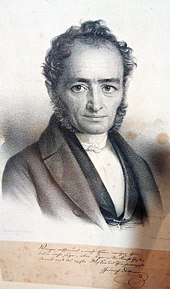Heinrich Wilhelm David Heman
Heinrich Wilhelm David Heman (born May 1, 1793 in children's home ; † July 4, 1873 in Basel ) was a German Protestant educator and missionary, as well as a well-known convert from Judaism to the Christian faith.
Live and act
He was born as Israel David and was the son of a devout , Jewish couple in the Palatinate children's home. The father worked there as a thief , the family lived in modest financial circumstances.
David was self-taught and worked as a private teacher for three years before successfully passing the exam at the Bavarian School Teachers' Seminar in Speyer in 1819 and subsequently receiving his teaching diploma. The prerequisite for this was employment at a “well-established, permanent school”, which is why he had applied for the position of teacher at the Jewish school in Grünstadt .

Israel David acted as a Jewish teacher in Grünstadt from 1820. In 1824 the Pestalozzi pupil Heinrich Dittmar came here and took over the position of sub-rector, from 1827 the rector of the local Latin school . Dittmar was a devout Pietist and wanted to read the Old Testament in its original language for his biblical studies . For his part, David aspired to learn Greek and to be introduced to the New Testament . Both became friends, got into a lively exchange of ideas and taught each other. From around 1832 Wilhelm Stern , director of the Karlsruhe teachers' college, entered into this friendship and often visited both men in Grünstadt. He too was a Pestalozzi student and a devout Protestant Christian.
In Israel David matured the decision to convert to the evangelical faith. On June 23, 1833, he was baptized in Grünstadt with his wife and three children. He took “Heman” ( the believer ) as his family name, and he now had the previous family name “David” as his first name. The other given names Heinrich and Wilhelm apparently come from friends Heinrich Dittmar and Wilhelm Stern, who presumably also acted as godparents. Heman's conversion to Christianity was very well known at the time and sparked heated controversy. He lost his teaching job, relatives and friends tried to dissuade him, and his mother publicly renounced him.
Heinrich Dittmar employed his friend as a private mathematics teacher at his Latin school; he and his colleagues financed the salary. Finally, Heman got a state job as a realteacher at the Grünstadt Latin School, and the top Bavarian schoolboy, Friedrich Thiersch , expressly praised his achievements in 1838.
Since Heinrich Wilhelm David Heman was more interested in theology and wanted to win other Israelites over to the Christian faith, he accepted the offer in 1844 to run a mission house for converted Jews in Basel. This institute, called the " Proselytenhaus ", was newly founded there in 1842 by the Evangelical Association of Friends of Israel . Heman headed the institution for 29 years, until his death in 1873, and also undertook missionary trips to Germany and Switzerland.
His son, the Protestant pastor and later professor of theology, Carl Friedrich Heman (1839-1919), succeeded him in 1874 in the management of the proselyte house.
literature
- Franz Delitzsch : Saat auf Hope: Journal for the Mission of the Church in Israel , organ of the Evangelical Lutheran Central Association for Mission under Israel, Volume 13, Erlangen, 1876, pp. 126–129; (Digital scan)
Web links
- Entry on David Heman in the Rhineland-Palatinate personal database
- Heinrich Wilhelm David Heman in the German biography
- Reports from Heinrich Wilhelm David Heman on his missionary work (Basel-Stadt State Archives)
Individual evidence
- ^ Franz Josef Heyen, Karl Heinz Debus: Enlightenment, Equal Opportunities, Reform and Self-Reflection , Volume 4 of: Documentation on the history of the Jewish population in Rhineland-Palatinate and Saarland from 1800 to 1945 , self-published by the Rhineland-Palatinate State Archives Administration, Koblenz 1974, p 332; (Cutout scan 1) , (Cutout scan 2)
- ↑ JFA de Le Roi: The evangelical Christianity and the Jews in the time of the rule of Christian views of life among the peoples , Volume 2: Second half of the 18th century, the European mainland during the 19th century , Verlag H. Reuther, 1891, p 276; (Detail scan)
- ^ Documentation on the history of the Jewish population in Rhineland-Palatinate and Saarland from 1800 to 1945 , Volume 20, Part 2, self-published by the Landesarchivverwaltung Rheinland-Pfalz, Koblenz 1982, p. 590; (Cutout scan 1) , (Cutout scan 2)
- ^ E. Kehr: Pedagogical sheets for teacher training and teacher training institutions , Volume 2, Gotha 1873, p. 258; (Digital scan)
- ↑ Evangelische Kirchen-Zeitung: Organ of the Evangelical Lutheran within the Prussian Regional Church , Berlin 1866, column 949 of the year; (Digital scan)
- ^ Friedrich Thiersch: About the current state of public education in the western states of Germany, in Holland, France and Belgium , Volume 1, Cotta, Stuttgart 1838, p. 62; (Digital scan from the source)
- ^ Calwer Missionsblatt , 17th year, 1844, appendix to no. 24; (Digital scan)
- ↑ Bonaventura Mayer: The Jews of Our Time: a concise presentation of their religious and political conditions in the three old parts of the world , Regensburg, 1842, p. 50; (Digital scan)
| personal data | |
|---|---|
| SURNAME | Heman, Heinrich Wilhelm David |
| ALTERNATIVE NAMES | David Heman, Israel David (maiden name) |
| BRIEF DESCRIPTION | Jewish educator, convert to Christianity, evangelical missionary |
| DATE OF BIRTH | May 1, 1793 |
| PLACE OF BIRTH | Children's home |
| DATE OF DEATH | 4th July 1873 |
| Place of death | Basel |